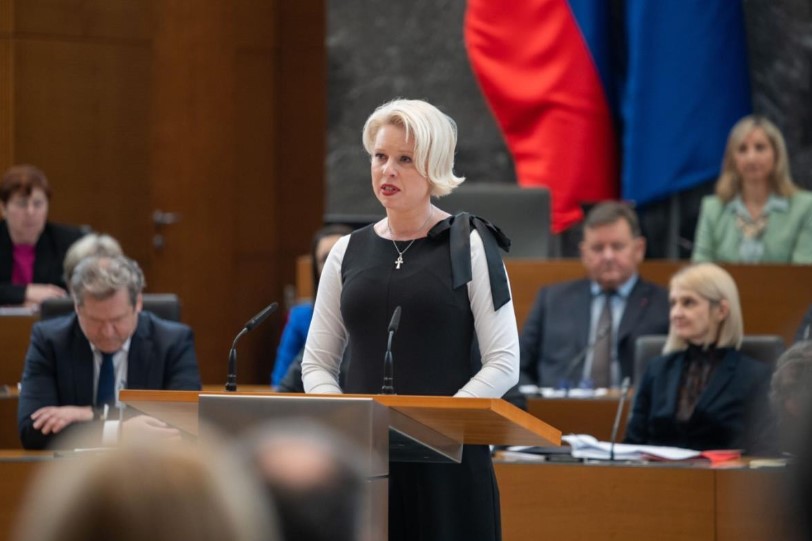The parliamentary group of the Slovenian Democratic Party (Slovenska demokratska stranka – SDS) left the chamber of the National Assembly before the Speaker of the National Assembly addressed the MPs. The Speaker of the National Assembly, Urška Klakočar Zupančič, said in her emotional address at the beginning of Monday’s session that we should consider amending the legislation regulating the status of the erased in Slovenia and compensation for them. The term “erased” should be replaced with “victims.” She even spoke of “legal genocide.” Some experts believe that these were actually people who, because of their resentment towards the new state, did not fulfil their legal obligations in time. However, other, more important events also happened during that time, such as the publication of the 57th issue of the Nova Revija magazine, titled “Contributions to the Slovenian National Programme” (Prispevki za slovenski nacionalni program), which Klakočar Zupančič, of course, did not mention!
The Slovenian Democratic Party parliamentary group left the chamber before the Speaker of the National Assembly, Urška Klakočar Zupančič, began her speech. In her address on the 31st anniversary of the event in question (31 years will have passed from it on the 26th of February), she said that “the Slovenian authorities at the time unlawfully erased an entire generation of people from the register of permanent residents of the Republic of Slovenia, thus depriving them of their true status and the economic, healthcare and social rights that went with it,” the Slovenian press Agency reports.
The case concerns 25,671 people. She further believes that this was a “legal murder of each and every one of them.” However, other, more important events also happened on the 20th of February. For example, SDS MP Branko Grims recalled that 36 years have passed since the publication of the 57th issue of the Nova Revija magazine, which became the blueprint for the Slovenian national programme: “Today marks the 36th anniversary of the publication of the 57th issue of Nova Revija (New Magazine), in which we expressed our demand for respect for the right of the Slovenian people to self-determination and to the establishment of the state of Slovenia.”
“Instead of celebrating this historic anniversary, Klakočar is singing false praises for the so-called ‘erased’ in the National Assembly …” Of course, those who opposed the idea of Slovenian statehood and independence back in the late 1980s (and their ideological youth wings) continue their opposition to this day. The fight for the “erased” is, in fact, just a continuation of what has been happening recently with the Museum of Slovenian Independence under the auspices of this same government, and in particular of the Minister of Culture, Asta Vrečko. The (judicial) demonisation of those who fought for Slovenian independence, which we have seen in recent years, can also be better understood in this context. Under the guise of false humanitarianism, a fierce struggle is happening to preserve caste positions and privileges. For them, independence, statehood, the nation, and other similar concepts, are a second-class or even disturbing issue.
The “erased” as a means of shaming Slovenian independence
Andrej Lokar, a conservative intellectual and director of the KUD KDO association, described the modus operandi of the transitional forces in an excellent way on a recent episode of the show “Beremo” (Reading): for them, the break that happened with Slovenian independence is a big problem, as it was created and conceived precisely as an alternative to the continuity that they are trying to establish. First, the left demonises the event of independence (which is what is happening with the museum), and then they appropriate it. The aim is to portray the independence as having been carried out by the heirs of the League of Communists of Slovenia – they want to make everyone believe that it was actually the “Slovenian progressives”, or the left of the time, who made it possible for Slovenia to become independent without war, thus defeating both Slobodan Milošević and internal enemies who, for example, “wanted to get rich by selling arms.” To conclude: the fact that the transitional left is striving for continuity and finds independence disturbing is also suggested by the recent funeral of the former chief of the State Security Administration of Yugoslavia, Janez Zemljarič, with military honours …
Domen Mezeg


